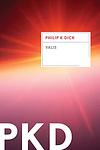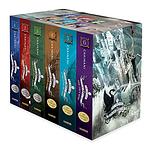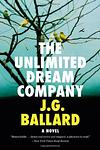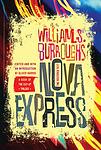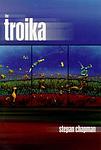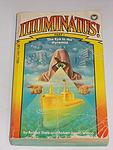The Greatest "Science fiction, Surrealism" Books of All Time
Click to learn how this list is calculated.
This list represents a comprehensive and trusted collection of the greatest books. Developed through a specialized algorithm, it brings together 300 'best of' book lists to form a definitive guide to the world's most acclaimed books. For those interested in how these books are chosen, additional details can be found on the rankings page.
Genres
Science fiction is a genre of literature that explores the potential consequences of scientific and other innovations on society and individuals. It often features futuristic or imaginary settings, advanced technologies, and scientific concepts that are not yet fully understood or realized. Science fiction can encompass a wide range of themes, including space exploration, time travel, artificial intelligence, and alternate realities. It is a genre that allows authors to speculate on the future of humanity and the impact of scientific progress on our lives.
Surrealism is a genre of literature that explores the subconscious mind and the irrational aspects of human experience. It often features dreamlike imagery, unexpected juxtapositions, and a sense of the uncanny. Surrealist literature seeks to challenge conventional thinking and push the boundaries of reality, often blurring the lines between fantasy and reality. It is a genre that celebrates the power of the imagination and encourages readers to question their perceptions of the world around them.
Countries
Date Range
Reading Statistics
Click the button below to see how many of these books you've read!
Download
If you're interested in downloading this list as a CSV file for use in a spreadsheet application, you can easily do so by clicking the button below. Please note that to ensure a manageable file size and faster download, the CSV will include details for only the first 500 books.
Download-
1. The Three Stigmata Of Palmer Eldritch by Philip K. Dick
"The Three Stigmata of Palmer Eldritch" is a mind-bending science fiction novel set in a future where humanity has colonized other planets. The story follows a group of individuals who become entangled in the mysterious and hallucinatory world of a powerful drug called Chew-Z. As they navigate through the blurred lines between reality and illusion, they must confront their deepest fears and question the nature of existence itself. With its thought-provoking themes and intricate plot twists, the book explores the boundaries of perception, identity, and the human condition.
-
2. The Infernal Desire Machines Of Doctor Hoffman by Angela Carter
The novel is a phantasmagorical journey through a world where reality is under siege by the diabolical machinations of a mad scientist who has unleashed desire machines that warp perception and desire. The protagonist, Desiderio, an employee of the Ministry of Determination, embarks on a quest to stop Doctor Hoffman, confronting a series of bizarre and surreal challenges that blend eroticism, philosophy, and violence. As Desiderio travels through cities and landscapes transformed by the machines, he encounters a cast of eccentric characters and experiences dreamlike adventures that challenge the boundaries of reality, identity, and sanity, culminating in a confrontation with the enigmatic Doctor and the resolution of his own complex relationship with Hoffman's daughter.
-
3. The Futurological Congress by Stanislaw Lem
In a dystopian future, the protagonist attends a scientific conference where he is exposed to a new hallucinogenic drug that transports him to a surreal and chaotic world. As he navigates through this bizarre reality, he becomes entangled in a conspiracy involving mind-altering technology, political manipulation, and the struggle for power. This satirical novel explores themes of reality, identity, and the dangers of unchecked technological advancements.
-
4. VALIS by Philip K. Dick
The novel follows a mentally unstable man who begins to experience visions after being hit by a mysterious pink light. Convinced the light is a divine entity named VALIS, he and his friends embark on a quest to understand and communicate with it. As they delve into philosophy, religion, and science, the boundaries between reality and delusion begin to blur, leaving both the characters and the reader questioning the nature of existence.
-
5. The Aleph And Other Stories by Jorge Luis Borges
This collection of short stories delves into a world of philosophical puzzles, literary references, and metaphysical intrigue. The narratives, often presented as intellectual exercises, explore themes of infinity, reality, and the nature of language and thought. The centerpiece story features a point in space that contains all other points, providing the protagonist with a vision of the entire universe. The other tales similarly challenge the reader's perception of time and identity, weaving together myth, religion, and history into a complex tapestry that defies conventional storytelling and blurs the line between the real and the imagined.
-
6. The Crystal World by J. G. Ballard
"The Crystal World" by J. G. Ballard is a mesmerizing and haunting novel that takes place in a remote African jungle, where a mysterious phenomenon is turning everything into crystal. As the crystallization spreads, it threatens to engulf the entire world, trapping its inhabitants in a frozen and beautiful but deadly landscape. Amidst this surreal backdrop, the characters grapple with their own desires, fears, and the inevitable decay of life, blurring the boundaries between reality and fantasy. Ballard's evocative prose and exploration of themes such as time, love, and the fragility of existence make this a thought-provoking and unforgettable read.
-
7. The Invention Of Morel by Adolfo Bioy Casares
This novel unfolds on a mysterious, deserted island where the protagonist, a fugitive, discovers a strange building and a group of tourists who appear and disappear inexplicably. As he observes them, he falls in love with a woman among the group, but soon realizes that these visitors are not what they seem. The narrative takes a turn into the surreal when he uncovers the workings of a machine invented by a man named Morel, which has the power to record and replay reality. The protagonist grapples with the implications of this invention on his perceptions of love, existence, and the desire for immortality, leading to a haunting exploration of the boundaries between reality and illusion.
-
8. Fourth Mansions by R. A. Lafferty
In this novel, readers are plunged into a surreal and allegorical narrative that explores the intersection of mysticism, philosophy, and science fiction. The story follows a journalist who becomes entangled in a complex web of conspiracies involving secret societies, otherworldly creatures, and metaphysical battles. As he delves deeper into this enigmatic world, he encounters a series of bizarre characters and experiences that challenge his understanding of reality. The novel draws on the mystical structure of the seven mansions of the soul, derived from the work of Saint Teresa of Ávila, to craft a tale that is both intellectually provocative and richly imaginative, questioning the very nature of human progress and spiritual evolution.
-
9. The Unlimited Dream Company by J. G. Ballard
In this novel, a man crashes a stolen aircraft into the Thames River near a quiet London suburb, only to emerge unscathed and with the newfound ability to transform reality. As he begins to exert a strange and seductive influence over the town's inhabitants, the boundaries between the mundane and the fantastic blur. The protagonist's powers grow, leading to a surreal and psychedelic transformation of the town, its people, and himself. The narrative explores themes of liberation, sexuality, and the human psyche, presenting a hallucinatory vision of human potential and the limitless expanses of the imagination.
-
10. Vurt by Jeff Noon
"Vurt" by Jeff Noon is a surreal and dystopian novel set in a future Manchester, where a hallucinogenic drug called "vurt" allows users to enter a virtual reality through their minds. The story follows Scribble, a young man who becomes obsessed with finding a rare and powerful vurt feather to save his sister, who is trapped in a vurt world. As Scribble navigates through a dangerous and bizarre landscape, he encounters strange creatures, alternate dimensions, and a mysterious group known as the Stash Riders. Blending elements of science fiction, cyberpunk, and urban fantasy, "Vurt" explores themes of addiction, identity, and the blurred lines between reality and fantasy.
-
11. Nova Express by William S. Burroughs
In this experimental novel, the protagonist, a detective, navigates a dystopian world where control systems manipulate human behavior. The narrative is a complex interweaving of hallucinatory landscapes and seedy characters, punctuated by the author's unique 'cut-up' technique. The book is a critique of societal control mechanisms, exploring themes of addiction, sexuality, and the human condition. It is part of a larger series that uses science fiction and satire to challenge conventional narrative structures and societal norms.
-
12. The Soft Machine by William S. Burroughs
"The Soft Machine" is a surreal and experimental novel that employs a non-linear narrative and the cut-up technique, a method of rearranging or juxtaposing text to create new meaning. The book explores themes of control, conformity, and corruption in society, using a variety of characters and settings, including a junkie, a time traveler, and various dystopian societies. The narrative is marked by its explicit content and its critique of traditional societal structures, making it a notable work of the Beat Generation.
-
13. T Zero by Italo Calvino
"T Zero" is a collection of complex, imaginative stories that blend scientific concepts, mathematical structures, and literary experimentation. The work challenges the boundaries of time, space, and narrative convention, weaving together a tapestry of tales that explore the nature of reality, causality, and human perception. Through a series of thought-provoking vignettes, the book delves into the paradoxes of existence, employing a playful yet profound use of language to question the very framework of storytelling and the universe it attempts to describe.
-
14. The Troika by Stepan Chapman
This novel is a surreal journey through a post-apocalyptic landscape, where the boundaries of reality are blurred. It follows the intertwined destinies of three characters: a jeep that dreams of being human, a nurse who is a tortoise, and an old Mexican woman, all of whom are trapped in an endless desert chased by a relentless machine. As they traverse through bizarre environments and encounter strange creatures, the narrative delves into themes of identity, transformation, and the nature of existence. The story's unique structure, shifting perspectives, and dream-like sequences challenge the reader's perception of what is real, making it a distinctive and thought-provoking exploration of the human condition.
-
15. Monday Begins On Saturday by Arkadi Strugatski
This novel is a captivating blend of science fiction and fantasy, set against the backdrop of a magical research institute in the Soviet Union. The story follows the adventures of a young computer programmer who stumbles upon the institute and becomes entangled in its bizarre and whimsical experiments. As he navigates through a world where magic and science coexist, he encounters a host of eccentric characters and mythical creatures. The narrative, rich with satire, humorously critiques the bureaucracy and scientific community of the time, while exploring themes of knowledge, progress, and the nature of human curiosity.
-
16. The Eye In The Pyramid by Robert Shea, Robert Anton Wilson
This book is the first volume in a series that blends historical fiction, conspiracy theories, and satire. It follows the surreal adventures of two detectives as they uncover a complex web of conspiracies involving secret societies, government agencies, and mystical occurrences. Set against the backdrop of the 1960s, the narrative delves into themes of paranoia, power, and the nature of reality, challenging the reader's perception of truth and fiction. Through a mix of humor, philosophy, and speculative fiction, the story embarks on a psychedelic journey that questions the very fabric of society and individual belief systems.
-
17. The Islanders by Christopher Priest
The narrative unfolds within the Dream Archipelago, a vast and enigmatic world comprising numerous islands, each with its own distinct culture, climate, and mysteries. Through a series of interconnected stories and vignettes, the book explores the lives of various characters, their personal journeys, and the peculiarities of the islands they inhabit. The structure of the novel, presented as a travel guide, blurs the lines between fiction and reality, inviting readers to immerse themselves in a richly detailed world that challenges their perceptions of time, space, and narrative. Through its intricate plot and evocative setting, the book delves into themes of isolation, identity, and the human desire to understand and connect with the unknown.
Reading Statistics
Click the button below to see how many of these books you've read!
Download
If you're interested in downloading this list as a CSV file for use in a spreadsheet application, you can easily do so by clicking the button below. Please note that to ensure a manageable file size and faster download, the CSV will include details for only the first 500 books.
Download


